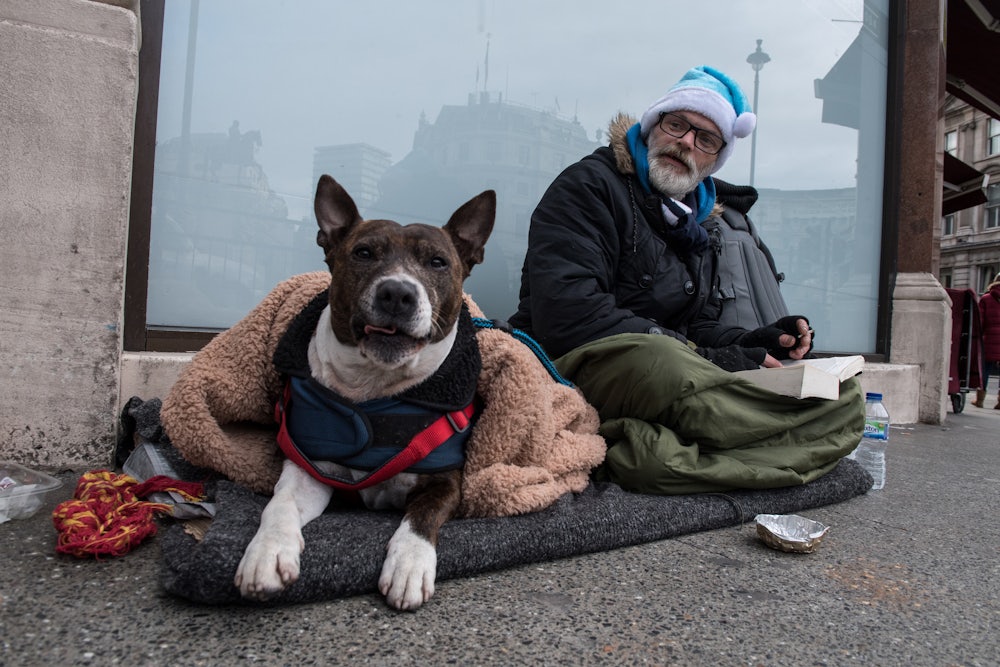One hundred and seventy-five years after it was published, Charles Dickens’s A Christmas Carol is still drawing audiences. This year, its nearly sold-out adaptation at The Old Vic theatre in London has a post-show collection for The Felix Project, an organization that collects surplus food and redistributes it to charities—a classic pairing for a work which, like many of Dickens’s works, gave the modern world some of its most poignant descriptions of poverty in Victorian Britain.
Nostalgia for this era is particularly strong at Christmas time, with many beloved modern traditions such as family ice skating, mince pies, and hot buttered rum rooted in nineteenth-century Britain. But in 2018, Dickens’s work resonates in more unsettling ways, as well.
Last month, the United Nations released a report containing a withering review of poverty in Britain, “the world’s fifth largest economy,” as UN Special Rapporteur Philip Alston noted. Citing the “immense growth in food banks and the queues waiting outside them, the people sleeping rough in the streets, the growth of homelessness,” Alston declared that “for almost one in every two children to be poor in twenty-first century Britain is not just a disgrace, but a social calamity and an economic disaster all rolled into one.”
The report rippled through the Westminster community, which finds itself in the midst of a fierce debate about the nature of “British” values as the U.K. attempts to extract itself from the European Union. The Conservative Party, which in recent years has pushed drastic cuts to welfare such as housing benefits, rejected the rapporteur’s findings, with Work & Pensions Secretary Amber Rudd describing its tone as “highly inappropriate.” On the opposing side, Labour leader Jeremy Corbyn tweeted: “The scale of poverty in Britain shames this Tory Government.”
Tensions were further inflamed as Conservative politicians were photographed smiling at food banks, a “photo opportunity” Corbyn quickly denounced during the weekly Prime Minister’s Questions. The Trussell Trust, a charitable organization of over 420 food banks across the UK, has warned of unprecedented projected levels of usage leading up to Christmas.
One of the culprits behind this increase, the UN report and Labour’s Jeremy Corbyn argue, is Universal Credit, a reform spearheaded by the Conservative Party that was meant to simplify the welfare system by streamlining multiple benefits into one monthly payment. Announced in 2010 at the Conservative Party Conference, UC, as it is informally known, began to be introduced in 2013 and was supposed to be rolled out across the U.K. by 2017. It has yet to be fully implemented and has been plagued by IT failures and accusations of management problems. In a letter to the Guardian in October, heads of multiple poverty and homeless organizations wrote that “one in five claims to universal credit currently fail because claimants find the process too complex,” leaving impoverished households “without essential support.” The combined payment also takes five weeks between people successfully filing a claim and when they actually receive benefits, with some reports of delays as long as twelve weeks. Labour member of Parliament Frank Field said in October that the delay had driven some of his female constituents to sex work.
Food banks have reported a fourfold increase in visitors, and a 52 percent increase in the number of three-day emergency food packages distributed, in areas where Universal Credit has been in place for 12 months or more, the Trussell Trust reported in April. Again, the wait time is the suspected culprit. “That is an awfully long time to wait, during which time many clients have been thrown into crisis, unable to afford a food shop and forced to come to the food bank,” Alice Clifford, who volunteers at a London food bank, told me. The UN rapporteur similarly blamed the delay, writing that it “pushes many who may already be in crisis into debt, rent arrears, and serious hardship, requiring them to sacrifice food or heat.”
Homelessness, meanwhile, is on a disturbing rise. Statistics released this month reveal that there are currently more than 120,000 children in temporary homes including bed and breakfast rooms and hostels—a twelve-year high. The charity Shelter put the number of homeless in Britain at 320,000 this year—an increase of 4 percent from the previous year. Official figures suggest that between 2010 and 2017 there was a 169 percent rise in homelessness.
The decisions forced by such rising numbers can be devastating. “Because resources are so scarce it turns council workers into ‘guardians’ of a very limited ‘pot of gold,’” Edward, a London social worker, told me. “So instead of being agents who are there to help people, they become people who have to guard against people who don’t deserve it enough: It’s soul destroying.” He compared it to the Victorian notion of the “deserving” and “undeserving” poor, portrayed in Dickens’s novels through characters such as Bob Cratchit in A Christmas Carol—decent and hard working, as compared to Bill Sikes, the villain in Oliver Twist. “You find yourself, without even realizing it, considering who deserves your help the most,” Edward said.
The forces behind poverty are, admittedly, complicated. “We kind of boil it down to three drivers: one is people getting stuck in low pay, one is housing costs rising and one is [the reduction in] disposable income,” Chris Goulden, deputy director at the Joseph Rowntree Foundation, a poverty research organization, told me.
Fifty-eight percent of impoverished Londoners are employed, but dealing with unaffordable rents, according to Manny Hothi, director of policy for Trust for London. Employers aren’t required to pay the “London Living Wage,” currently estimated to be £10.55 per hour, compared to the National Living Wage of £7.83 per hour.
Dickens paid several visits to areas of deep poverty in 1843, in the months before he wrote A Christmas Carol. “It’s scary seeing the number of homeless people right now,” Jane Young, an audience member at the Old Vic’s production this month told me. “It’s scary to think that society hasn’t changed enough to make this story irrelevant.”
